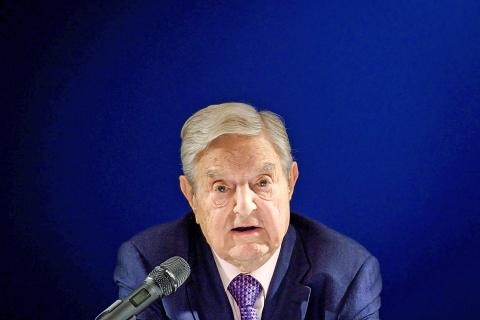US investor George Soros said there was a “mortal danger” of China’s use of artificial intelligence (AI) to repress its citizens under the leadership of Chinese President Xi Jinping (習近平), whom he called the most dangerous opponent of democracies.
“The instruments of control developed by artificial intelligence give an inherent advantage of totalitarian regimes over open societies,” the 88-year-old said on Thursday at the World Economic Forum in Davos, Switzerland. “China is not the only authoritarian regime in the world, but it’s undoubtedly the wealthiest, strongest and most developed in machine learning and artificial intelligence.”
The former hedge fund manager said that Beijing is developing a centralized database that would use algorithms to determine whether a person poses a threat to China’s one-party system.

Photo: AFP
While China’s so-called social credit system is not yet fully operational, “it will subordinate the fate of the individual to the interests of the one-party state in ways unprecedented in history,” Soros said.
“I find the social credit system frightening and abhorrent,” he said.
Soros drew a distinction between Xi and Chinese, saying the latter remain a main source of hope.
At the Davos conference last year, Soros criticized social-media giants Facebook Inc and Google. He compared them to gambling companies that foster addiction among users and said that they exploit the data they control.
Soros on Thursday reiterated the need to regulate technology firms while authoritarian regimes declare theirs as “national champions.”
“That’s what has enabled some Chinese state-owned companies to catch up with and even surpass the multinational giants,” he said.
In his speech, Soros touched on subjects including his childhood, running a hedge fund and his efforts to protect human rights.
He spoke at length about China, criticizing Xi and the nation’s Belt and Road Initiative infrastructure project as self-serving.
He also called Russian President Vladimir Putin another enemy of democracy.
“I’ve been concentrating on China, but open societies have many more enemies, Putin’s Russia foremost among them,” Soros said.

In Italy’s storied gold-making hubs, jewelers are reworking their designs to trim gold content as they race to blunt the effect of record prices and appeal to shoppers watching their budgets. Gold prices hit a record high on Thursday, surging near US$5,600 an ounce, more than double a year ago as geopolitical concerns and jitters over trade pushed investors toward the safe-haven asset. The rally is putting undue pressure on small artisans as they face mounting demands from customers, including international brands, to produce cheaper items, from signature pieces to wedding rings, according to interviews with four independent jewelers in Italy’s main

Japanese Prime Minister Sanae Takaichi has talked up the benefits of a weaker yen in a campaign speech, adopting a tone at odds with her finance ministry, which has refused to rule out any options to counter excessive foreign exchange volatility. Takaichi later softened her stance, saying she did not have a preference for the yen’s direction. “People say the weak yen is bad right now, but for export industries, it’s a major opportunity,” Takaichi said on Saturday at a rally for Liberal Democratic Party candidate Daishiro Yamagiwa in Kanagawa Prefecture ahead of a snap election on Sunday. “Whether it’s selling food or

CONCERNS: Tech companies investing in AI businesses that purchase their products have raised questions among investors that they are artificially propping up demand Nvidia Corp chief executive officer Jensen Huang (黃仁勳) on Saturday said that the company would be participating in OpenAI’s latest funding round, describing it as potentially “the largest investment we’ve ever made.” “We will invest a great deal of money,” Huang told reporters while visiting Taipei. “I believe in OpenAI. The work that they do is incredible. They’re one of the most consequential companies of our time.” Huang did not say exactly how much Nvidia might contribute, but described the investment as “huge.” “Let Sam announce how much he’s going to raise — it’s for him to decide,” Huang said, referring to OpenAI

The global server market is expected to grow 12.8 percent annually this year, with artificial intelligence (AI) servers projected to account for 16.5 percent, driven by continued investment in AI infrastructure by major cloud service providers (CSPs), market researcher TrendForce Corp (集邦科技) said yesterday. Global AI server shipments this year are expected to increase 28 percent year-on-year to more than 2.7 million units, driven by sustained demand from CSPs and government sovereign cloud projects, TrendForce analyst Frank Kung (龔明德) told the Taipei Times. Demand for GPU-based AI servers, including Nvidia Corp’s GB and Vera Rubin rack systems, is expected to remain high,